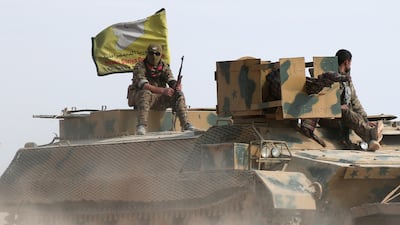To understand American policy short-sightedness in the region, look no further than northern Syria today. One can predict with utmost confidence that the policy that Washington insists on pursuing in Raqqa will do two things. It will heat up a secondary conflict in the broader Syrian civil war to a boiling point, and it will reset the conditions for the return of extremist forces.
A common way to deflect the troubling issues with the policy is to make it principally about Turkey. The overarching concern, though, is how a YPG-led campaign to dislodge ISIL from Raqqa will be perceived locally and beyond, and what the YPG seeks to gain from fighting in a predominantly Arab city that ISIL took from the Syrian rebels after the latter expelled the regime from it in 2013.
A YPG commander, Sipan Hemo, told Reuters on Friday that the attack on Raqqa will begin in early April. Everyone should wish the anti-ISIL forces luck, but it should be made clear that the United States is operating below the credit line politically. By that, I mean two things.
First, the win against ISIL would be purely tactical: the removal of ISIL militants from Raqqa will not damage the group’s image, as it should ideally have been designed to do. If policymakers involved in the campaign think the demise of the group in Raqqa in this manner will undermine its narrative, they will be mistaken and out of touch with reality.
Both Mosul and Raqqa are missed opportunities in this sense. The US could has used them to jump-start a policy or a road map that put an end to the cycle of violence in the two countries, and ensure these groups are fatally discredited.
Instead, the campaign in the two ISIL strongholds have turned into pure counterterrorism and military operations. As a counterterrorism operation, the US has done an impressive job in Mosul. But that does not necessarily translate into a serious damage to the group’s narrative and image – a core objective of Operation Inherent Resolve.
Second, the decision to dismiss such concerns and move into Raqqa with the same force that the previous administration relied on elsewhere disrupts a nascent positive trend in northern Syria. More and more members of the Syrian opposition are noticeably buying into the idea of fighting ISIL as a politically expedient project in and of itself, unlike previously when they wanted to focus on the regime of Bashar Al Assad – something the previous administration hoped to do, with no success.
One telling example is the growing number of rebel forces mobilising in northern, eastern and southern Syria against ISIL.
Those include the force led by Ahmed Al Jarba, former chief of the opposition’s Syrian National Coalition, which helped cut the last supply route into Raqqa from Deir Ezzor on March 6. Other examples include the New Syrian Army’s rebranded Elite Force and Usud Al Sharqiyyah (a credible force of a few hundred fighters who have been fighting ISIL in eastern Qalamoun since they were driven out by ISIL in 2014). Jaish Al Ashair is another group organised by Jordan to police camps hosting refugees from ISIL areas. Two other Arab blocs battling ISIL are the Turkish-backed rebels, operating under the Euphrates Shield, and the Syrian Arab Coalition, which operates under the banner of the US-backed YPG-led Syrian Democratic Forces.
Some of these groups already work with the YPG, which raises a question about why the US still wants to invest in the YPG rather than the collection of these forces. Such a move will no doubt help it recruit hundreds of other fighters since more people will be willing to join a rebel force rather than one seen as a vehicle for YPG hegemony.
The obvious reason is that the US simply does not want to deal with Russia, Iran and the regime when it decides to empower a rebel force to retake Raqqa. The US knows that the regime and its backers will object to the expansion of the rebels’ territorial control. In other words, the US prefers to continue with a faulty policy as long as it causes it less of a headache. It would rather deal with the consequences later than deal with the regime and its backers now.
Disparate rebel and Arab forces fighting ISIL can be better organised and more effectively mobilised under a formula that is seen as independent from the YPG hegemony. This formula does not have to mean abandonment of the YPG. But the formula should be seen legitimate, effective and fair by locals.
Instead, the US is missing an opportunity to discredit ISIL and is empowering a militia that is playing an oversized role in the north. This, among many issues, will provide jihadists with the ammunition to mobilise against the YPG and enable it to remain a permanent feature in the north-eastern Syrian landscape.
Hassan Hassan is a senior fellow at the Tahrir Institute for Middle East Policy and co-author of ISIS: Inside the Army of Terror
On Twitter: @hxhassan

